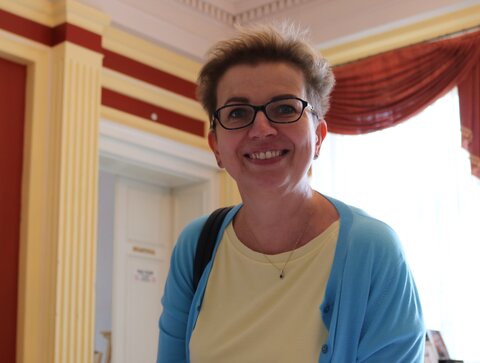Renata Suchowiejko


Renata Suchowiejko is professor of musicology and director of studies at the Jagiellonian University of Krakow. She directs the Department of Methodology and History of Music in the 19th and 21st Centuries of the Institute of Musicology UJ. In the years 2008-2012, she directed this institute. She teaches courses in music history (19th and 20th centuries) and methodology applied to musicological research. Visiting professor in Paris, Brussels, Bloomington, Weimar, Leipzig, Olomuc, Kovno, St. Petersburg and Moscow. She has directed research projects funded by the Polish Ministry of Science and Higher Education, the National Research Agency and the National Program for the Development of Human Sciences.
The project
Title: Edouard Ganche (1880–1945) and the Polish musical culture. Critical analysis of the sources.
Main Themes:
- Research on the violin virtuoso tradition in the 19th century.
- The process of emigration and musical migration, the circulation of repertoires and cultural transmissions in Europe during the nineteenth and twentieth centuries, especially the musical relations that Poland has maintained with France, Belgium and Russia.
- Reconstruction of musical life in independent Poland: art in the vortex of social, cultural and political changes after 1918.
- Polish musical presence in Paris in the nineteenth and twentieth centuries: the "Great Emigration" (after the failure of the Uprising of November 1830) and the period between the wars.
Selected Bibliography
Books:
- Album musical Marii Szymanowskiej/L’Album musical de Maria Szymanowska, édition critique franco-polonaise du manuscrit conservé à la Bibliothèque polonaise de Paris, Kraków 1999, p. 488.
- Henryk Wieniawski — kompozytor na tle wirtuozowskiej tradycji skrzypcowej XIX wieku [Henri Wieniawski — compositeur dans le contexte de la tradition virtuose de violon au XIXe siècle], Poznań 2005, p. 298.
- Henryk Wieniawski — wirtuoz w świetle krytyki muzycznej XIX wieku [Henri Wieniawski — virtuose à la lumière de la critique musicale au XIXe siècle], Poznań 2011, p. 451.
- Zabytki muzyczne w zbiorach Muzeum Uniwersytetu Jagiellońskiego, praca zbiorowa pod redakcją Renaty Suchowiejko [Les monuments musicaux des collections de l’université Jagellonne, travail collectif sous la direction de Renata Suchowiejko], Kraków 2016, p. 501.
Articles or Book chapters:
- « Les pianistes polonais dans la presse musicale parisienne à l’époque de Chopin. Contexte sociopolitique », in : Chopin and His Works in the Context of Culture, Éd. Irena Poniatowska, Kraków 2003, p. 184–192.
- Edward Wolff in the Revue et Gazette musicales de Paris : « Perspectives on a Musician’s Legacy », in : Musica Iagellonica, Kraków 2004, p. 229–240.
- Henryk Wieniawsk in America, « Ad Parnassum », vol. 3, no 5, April 2005, p. 45–55.
- « Du “métier à l’art” : l’enseignement de Vincent d’Indy », in : Vincent d’Indy et son temps, Éd. Manuela Schwarz, Sprimont 2006, p. 101–110.
- « Franco-Belgian School of Violin Playing. Techniques – Aesthetics – Didactics », in : Henryk Wieniawski and the 19th-century Violin Schools, Éd. Maciej Jabłoński, Danuta Jasińska, Poznań 2006, p. 167–180.
- « Henri Wieniawski — Henri Vieuxtemps. Parcours croisés », in : Revue belge de musicologie, vol. 60, 2006, p. 29–42.
- « Les Franckistes et la musique de chambre », in : Musica Iagellonica, Kraków 2007, p. 79–88.
- « Quo vadis ? de Jean Nouguès », in : Figures de l’Antiquité dans l’opéra français : des Troyens de Berlioz à Œdipe d’Enesco, Éd. Jean-Christophe Branger, Vincent Giroud, Saint-Étienne 2008, p. 295–309.
- « Polish Pianists in Paris: from "couleur locale" to Stylistic Cosmopolitanism », in : The Circulation of Music in Europe 1600–1900, Éd. Rudolf Rasch, Berlin 2008, p. 273–289.
- « Paganini in Poland and "Polish Paganinis" », in : Nicolò Paganini – Diabolus in Musica, éd. Andrea Barizza, Fulvia Morabito, Turnhout 2010, p. 65–76.
- « Karłowicz as Violinist », in: European ‘Fin-De-Siècle’ and Polish Modernism. The Music of Mieczysław Karłowicz, Éd. Luca Sala, Bologna 2010, p. 371–388.
- « Virtuoso – An Incarnation of God or Devil? Some Thoughts about Violin Virtuosity in the 19th Century », in: Instrumental Music and the Industrial Revolution, Éd. Roberto Illiano, Luca Sala, Bologna 2010, p. 99–108.
- « Schumann’s Violin Concerto between Poetry and Drama », in: Robert Schumann. Persönlichkeit, Werk und Wirkung, Éd. Helmut Loos, Leipzig 2011, p. 226–236.
- « The Carnival as a "Topsy–Turvy World" through the Eyes of the Violin Virtuoso », in: Henryk Wieniawski and the Bravura Tradition. Techniques of Playing, Performance, Questions of Sources and Editorial Issues, Éd. Maciej Jabłoński, Danuta Jasińska, Poznań 2011, p. 46–54.
- « Henryk Wieniawski’s Concert Performances in Russia », in: Fontes Artis Musicae, January – March 2011, vol. 58/1, p. 24–34.
- « La clarté latine : Pelléas et Mélisande et les compositeurs polonais », in : Pelléas et Mélisande cent ans après : études et documents, éd. Jean-Christophe Branger, Sylvie Douche, Denis Herlin, Lyon 2012, p. 125-134.
- « Ève/Mélisande et l’idée de l’éternel féminin ? » in: Function and Value. Proceedings from the 11th International Congress On Musical Signification, Éd. Teresa Malecka, Małgorzata Pawłowska, Kraków 2013, p. 571-583.
- « Le “debussysme” à la polonaise. Sur les traces de la formation d’un mythe », in : Regard sur Debussy, Éd. Myriam Chimènes, Alexandra Laederich, Paris 2013, p. 463–475.
- « Chopin au Théâtre italien en 1835 », in : Grandeur et finesse : Chopin, Liszt and the Parisian Musical Scene, Éd. Luca Sala, Turnhout 2013, p. 15–35.
- « Music Migration and Mobility in the 19th-century Europe: Readings in Dynamic Cultural Cartographies », in : Franjo Ksaver Kuhač (1834–1911). Music Historiography and Identity, Éd. Vjera Katalinič, Stanislav Tuksar, Zagreb 2013, p. 277-287.
- « Toutes les passions rapprochent les hommes. Le jeu du violon en tant qu’art oratoire et langues des sentiments », in : Ad Parnassum, vol. 11, April 2013, p. 43-55.
- « Les violonistes virtuoses et la presse au XIXe siècle : épistémologie d’une recherche à partir de l’exemple de Henryk Wieniawski », in : En pèlerinage avec Liszt : Virtuosos, Repertoire and Performing Venues in 19th-Century Europe, Éd. Fulvia Morabito, Turnhout 2014, p. 279-300.
- « Music Manuscripts in the Polish Library in Paris », in : Fontes Artis Musicae, vo. 61 (1), January-March 2014, p. 51-60.
- « Michał Spisak (1914-1965). Juwenilia. Zapomniane utwory z wczesnego okresu twórczości / Michał Spisak (1914-1965). Juvenilia. Forgotten Early Works », édition critique, Kraków 2015, p. I-XXXII, p. 1-105.
- « Polish Artists in Paris in the Interwar Period: Music Migrations, Transfer and Cultural Interactions », in: Sociocultural Crossings and Borders: Musical Microhistories, Éd. Rūta Stanevičiūtė, Rima Povilionienė, Vilnius 2015, p. 73-83.
- « Fonds Montpensier : Pologne. Источники – Контексты– Культурные связи », in : er amicorum Людмиле Ковнацкой, СПБ. : БиблиоРоссика, 2016, p. 202-214.

Aline Hémond

Caroline Renouard

Sophie Gambardella


